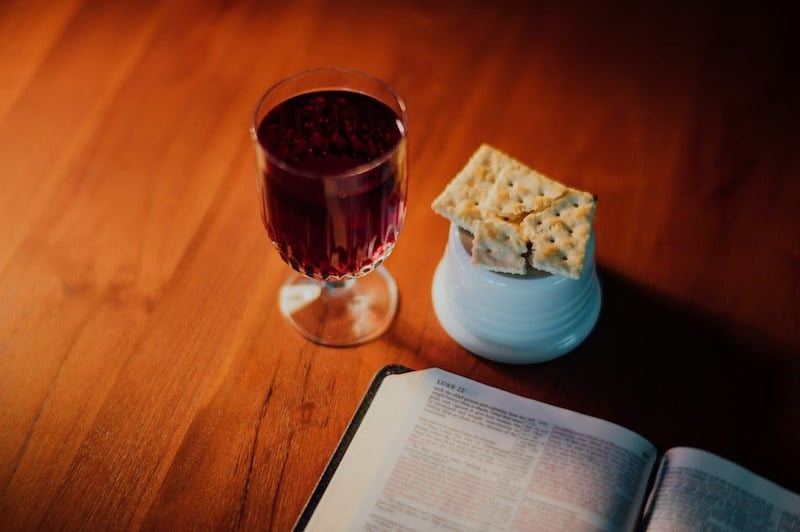
At the Lord’s Table, we are invited into a sacred sacrament—one that offers transformation, holds profound theological meaning, and provides deeply practical reminders. In a previous post, I mentioned that the Table invites us into a promise of trust. It also reminds us of what true victorious living looks like. This is not the kind of victory heralded by the prosperity gospel, which equates faith with on-demand through declarations and blessings with wealth, comfort, and worldly success. Rather, this is a victory held by Jesus and shaped by the cross: a life marked by surrender, suffering, and unwavering trust in God’s goodness, even during pain and hardship (Philippians 3:10-11; 2 Corinthians 12:9).
This post is part of a new blog series called This Is the Lord’s Table, where I’ll explore how communion is not just a ritual, but a quiet act of resistance—a re-centering in a noisy world, and a sacred reorientation to the Kingdom of God. The first post explored how the Lord’s Table is a promise of trust.
At the Lord’s Table, We Remember Victory
At the Table, we are reminded that the new covenant is represented by a love that overcomes enemies and persecution. We victoriously remember the promised hope of resurrection after death. At the Table, we are remembering that this is a life rooted not in our strength, but in the sacrificial love of Jesus in which he extends to us. The table is a time to celebrate a victory born through suffering, sealed by death, and gloriously declared in the resurrection (Romans 6:4-5; 1 Peter 2:21-25). In this way, at the Lord’s Table, we remember that this victory has already been won.
When I sit at the Lord’s Table, I face the words of Jesus, who declared, “Take heart! I have overcome the world” (John 16:33). Even more, in the resurrection, Jesus overcame death itself (1 Corinthians 15:54-57). This new life—a life of victory over both the world and death—is what God extends to us as Jesus followers who have confessed with our mouths that Jesus is Lord and believed in our hearts that God raised Him from the dead (Romans 10:9). The practice of the Lord’s Table reminds us of this new reality we are learning to live into and live out of.
This means that the Lord’s Table becomes a place of sacred remembrance and hopeful proclamation. We celebrate the sacrifice that freed us from the grip of sin and death, through the New Covenant we receive the Spirit of God who empowers us to live transformed lives, and we are sent out to overcome the world—not by force, but by love, faith, and the enduring power of the resurrection life Jesus has given us (Romans 8:11; 1 John 5:4–5).
The Table Is a Celebration of Victory
When we gather at the Lord’s Table, we remember that Jesus instituted this practice of the Lord’s Table during a Passover celebration—a meal that has always been a sign of God’s deliverance. Passover reminded the Israelites of how they were liberated from Egypt, saved by the blood of the lamb. In that same spirit, Jesus redefined the moment by offering Himself as the true Lamb of God, a saving act as the sacrificial lamb for those of us lost in our sins and brokenness. We celebrate that God has extended His victory, authority, and Spirit to us. As one rabbi once said of Passover, “To celebrate it is to step into the story.” That’s what we do each time we come to the Table—we step into the story of God’s love that liberates us from the death grip of sin, and we rejoice in how this love is reshaping our love towards life and others.
A Constant Reminder of Resurrection
Since the earliest days of the Church, believers have gathered on Sundays—Resurrection Day—to remember and proclaim the gospel: Christ has died, Christ is risen, Christ will come again. To declare this good news victoriously, the early church practiced the Lord’s Table most times that they gathered. When we come to the Table, we don’t just remember the cross—we proclaim Jesus’ victory, the resurrection. We proclaim that death has lost its sting and sin has lost its grip. Jesus tore the prison bars of death away, and now we live as a victorious people, raised to new life. We, too, can overcome sin, the world, and death because of God—God does the work, but we celebrate the spoils of the battle. This is not a militant triumphalism, but a celebration of what Christ has done on our behalf.
We Celebrate Overcoming Power
As we hold the bread and cup, we proclaim the New Covenant but also the victorious truth that “Up from the grave He arose!” Jesus has promised to drink wine again with us in Heaven’s final restoration. Jesus has gone ahead of us, preparing a place. Now, through belief in Jesus, we are raised with Christ, alive in the Spirit, walking in newness of life. We can go again, because “Up from the grave He arose!” We are no longer defined by the sin that held us or the death that haunted us. We are defined by the One who overcame it all. At the table, we are reminded of who and what truly defines us.
Liberated to Liberate Others
We are reminded at the Table, this practice is not just for us—it is for the world. In ancient wars, messengers would carry the “gospel”—the good news that victory had been won, and peace was coming. The resurrection is the declaration of God’s deliverance. As we come to the Table, we come as witnesses to a risen Savior, not as mourners of a death, but as proclaimers of victorious new life. At the Table, we declare the truth of John 3:16, and remember that as the people who have been transformed by this story, we are now called to carry the message to others. We find ourselves realigned to the purpose of God’s restorative work at the Lord’s Table, and we remember we are bearers of this good news, called to embody and announce the victory of Christ in our daily lives.
Rooted in a Community of Victory
Like Passover, Jesus instituted the practice of the Lord’s Table in community. We don’t come to the Table alone. We come together as brothers and sisters in Christ. We sit at the table together in a way that reminds each other that we have a new family, and this family is empowered to remind each other of the victorious hope and Spirit we now live by. In this way, gathered with others, the Table empowers us to keep moving—and help others move—toward the victory Jesus has promised. This shared act roots us in community and reminds us that we’re not only saved from something but also saved for something: to walk together in the resurrected life.
At the Lord’s Table
We sit down in humility and gratitude, receiving what was accomplished on the cross.
We rise up in joy and boldness, celebrating all that Christ Jesus has done and is still doing.
We look around and see a family formed by grace and grounded in hope.
P.S. You can learn more about me at jeffmclain.com.












